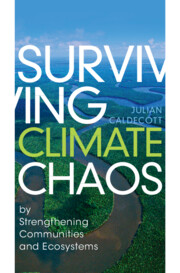Book contents
- Surviving Climate Chaos
- Surviving Climate Chaos
- Copyright page
- Dedication
- Contents
- Preface
- Acknowledgements
- Part I Context, Tools and Systems
- Part II Understanding Climate Chaos
- 3 Systems, Climate and Ecology
- 4 Making Systems Stronger
- Part III Practical System Strengthening
- Part IV Global Perspectives
- Part V Conclusions
- Abbreviations and Acronyms
- References
- Index
3 - Systems, Climate and Ecology
from Part II - Understanding Climate Chaos
Published online by Cambridge University Press: 02 September 2021
- Surviving Climate Chaos
- Surviving Climate Chaos
- Copyright page
- Dedication
- Contents
- Preface
- Acknowledgements
- Part I Context, Tools and Systems
- Part II Understanding Climate Chaos
- 3 Systems, Climate and Ecology
- 4 Making Systems Stronger
- Part III Practical System Strengthening
- Part IV Global Perspectives
- Part V Conclusions
- Abbreviations and Acronyms
- References
- Index
Summary
To talk about climate change needs ideas of systems and chaos, but also the conceptual vocabularies of physics, law, socialism, capitalism, economics, religion, anthropology and ecology. Ecology offers the most useful reference language, but there are similarities between ecological systems that depend on webs of life, biodiversity and functional integrity, and human social systems that depend upon forums, culture and resource-tenure security. Climate change is most clearly directional and its effects most predictable at the ‘macro’ (continental and global) level, and its effects are most chaotic and least predictable at the ‘micro’ (local and landscape) level. People depend on ecological conditions at the micro level, where strong ecological and social systems are better able than weak ones to withstand any impact. Thus, preserving and restoring the strength of systems at the micro level is a key to adaptation, and algorithmic principles for this depend on understanding and sharing knowledge, envisioning the future, choosing good leaders and leaving no one behind. The latter requires collective security based on small groups in which people know each other well enough to identify and protect the vulnerable.
Keywords
- Type
- Chapter
- Information
- Surviving Climate Chaosby Strengthening Communities and Ecosystems, pp. 61 - 89Publisher: Cambridge University PressPrint publication year: 2021



